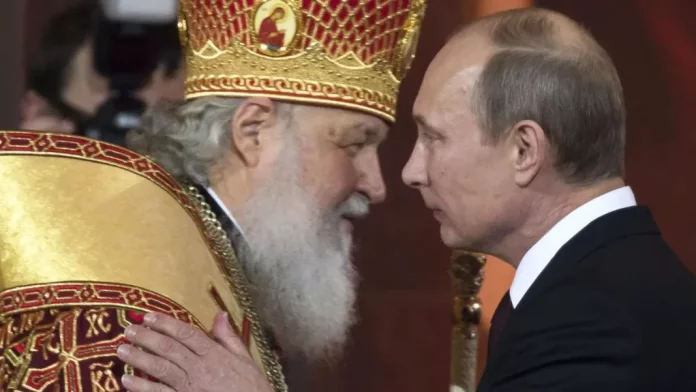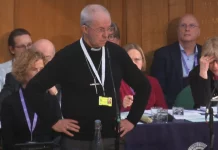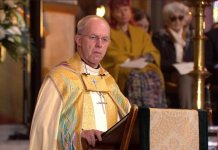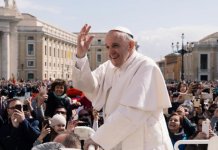On March 27, the Russian Orthodox Church (ROC) adopted an ideological policy document at the World Russian People’s Council that recognizes Russia’s invasion of Ukraine as a “holy war” and “a new stage in the national liberation struggle … against the criminal Kyiv regime and the collective West.” The document also asserts the church’s sole authority over modern-day Ukraine. It goes on to outline the “Russian world” (russkiy mir) concept as “wider than the state borders of both the present-day Russian Federation and greater historical Russia.” The ROC claims that the primary aim of Russian foreign policy should be the “re-unification of the Russian people” while maintaining its place as a “leading center of a multipolar world.” Additionally, the mandate discusses the so-called “trinity doctrine,” which erroneously claims the “Russian nation” consists of ethnic Russian, Belarusian, and Ukrainian subgroups (Russian Orthodox Church, March 27). Patriarch Kirill and his church have played a central role in drumming up support for the war effort and projecting Russian influence abroad. The patriarch’s approval of this latest edict points to the ROC’s commitment to winning the Kremlin’s “long war” against Ukraine and sowing discord in the West.
Moscow claims that it is waging a war not only against Ukraine but also with the collective West. Kremlin propaganda asserts that the wider conflict is necessary to defend Russia’s great-power status and cause a split in the Western world. Within this wider strategy, the ROC actively uses its influence abroad to try to reestablish Russia’s sphere of influence over the countries of the post-Soviet space. Russian President Vladimir Putin constantly condemns the West for “denying moral principles and all traditional identities” while presenting Russia as the keeper of the “Christian values that form the foundation of Western civilization.” (Kremlin.ru, September 19, 2013). The Kremlin leader’s words, however, ring false when Patriarch Kirill describes Moscow’s war as a “metaphysical battle against an ungodly international order” and Russian Orthodox priests sanctify the many atrocities committed by Russian forces against the Ukrainian people (Russian Orthodox Church, March 8, 2022).
The Kremlin has long used the ROC as a tool for achieving certain national security and foreign policy goals. In 2000, Putin introduced the new Russian National Security Concept that included a separate doctrine on “spiritual security” (see EDM, January 21, 2000; BITS, accessed April 8). The document stated that safeguarding Russian security also entails protecting the “historical, spiritual, cultural, and ethnic heritage of all Russians.” The 2000 concept, along with subsequent national security concepts, have consistently illustrated the lack of separation between church and state in projecting Russian power and influence abroad and achieving Putin’s megalomaniacal desires.
In Kyiv, the ROC has worked tirelessly to undermine successive Ukrainian governments’ efforts to maintain the country’s national identity and culture as distinct from Russia. The church has attempted to stymie Ukraine’s integration with the West, denouncing the 2004 Orange Revolution and 2014 Euromaidan protests (Radio Free Europe/Radio Liberty, December 21, 2004; Euromaidan Press, August 28, 2014). Moscow fears that “the loss of Kyiv,” which represents “the foundation of Russian civilization” in the minds of the Russian elites, will be followed by “the separation of Orthodox Christians” and the eventual demise of the Russian world (UCMC, May 28, 2021).
The ROC has also been instrumental in establishing spy networks throughout the post-Soviet space and in the West. The Kremlin has used the church’s influence in its efforts to recruit spies in Europe, the United States, and elsewhere. Clergy members in some countries have even been accused of working with and running recruitment schemes for Russian intelligence and security groups (Agentura, September 18, 2023). Other countries claim that ROC representatives are working with the Russian security services to promote the Kremlin’s agenda and hire informants. For example, in September 2023, Bulgaria deported Russian Archimandrite Vassian and two Belarusian priests for “serving Moscow’s geopolitical interests” (Ukrainska Pravda, September 21, 2023). The Bulgarian National Security Service stated that the clerics had been deported because they represented a danger to national security by deliberately attempting to sway Bulgaria’s political structures to suit the Kremlin’s objectives in Europe. Vassian is also persona non grata in North Macedonia for openly advocating for official Russian policy and trying to cause a split in the Macedonian Orthodox Church.
Read it all at the Jamestown Foundation’s Eurasia Monitor










